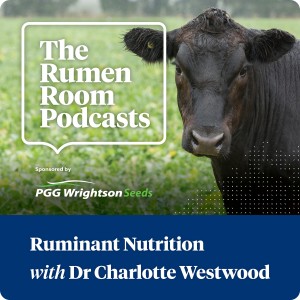
Friday Feb 16, 2024
45. Dietary Cationic Anionic Difference (DCAD) – One strategy for reducing challenges of low blood calcium in dairy cows
Our latest podcast explores DCAD - one specific aspect of the diet of “springer” (“close-up”) dairy cows.
The Rumen Room Podcast has briefly discussed DCAD previously (Episodes 10 and 34). Changing the DCAD of a springer cow diet potentially reduces risk of hypocalcaemia (low blood calcium) in cows before, during and immediately after calving.
This latest episode takes a deeper dive into the detail of DCAD, explaining what DCAD is, what stock class stands to benefit the most from changing dietary DCAD, and how dietary DCAD influence risk of hypocalcaemia. Practical approaches to DCAD management for pasture-fed cows are covered and options for dietary DCAD additives are investigated.
Location of topics within our latest podcast.
1.00 DCAD as just one aspect of the springer dairy cow diet.
1.45 Introduction to the DCAD podcast
4.55 The definition of DCAD
5.45 Dietary cations and anions explained
6.45 The four dietary elements contributing to DCAD: Potassium, sodium, sulphur and chloride
7.50 The DCAD equations – there are a few out there, we like “equation 1” for calculating DCAD
9.10 How does changing DCAD work? DCAD simplified!
10.50 What’s the “ideal” DCAD for springer diets?
11.35 How long should springer dairy cows be exposed to low or negative DCAD diets before calving?
12.55 DCAD once a cow has calved
14.41 How slight changes to blood pH reduce risk of hypocalcaemia
22.00 High potassium ryegrass (and other types of feeds) and DCAD in springer diets
23.40 Ryegrasses can accumulate lots of potassium!
24.42 Whey applied to pasture as a risk factor for high potassium and high DCAD pastures
25.45 Lucerne silage, baleage or hay and DCAD and calcium in springer diets
27.25 Sodium as a driver of DCAD for New Zealand pasture-fed springers
28.35 Lower DCAD feeds for springer diets – Maize (corn) silage
30.40 Additives that change the DCAD of springer cow diets
35.30 “Do no harm when trying to solve a milk fever problem” – the risk of reducing feed intake by springer cows when unpalatable / not very tasty anionic products are added to diets
37.45 Negative DCAD additives that also deliver calcium: Calcium chloride & calcium sulphate
40.35 Measuring DCAD of feeds – the role for feed testing and springer cow urine testing
43.20 Concluding / summing up the DCAD podcast
Comments (0)
To leave or reply to comments, please download free Podbean or
No Comments
To leave or reply to comments,
please download free Podbean App.